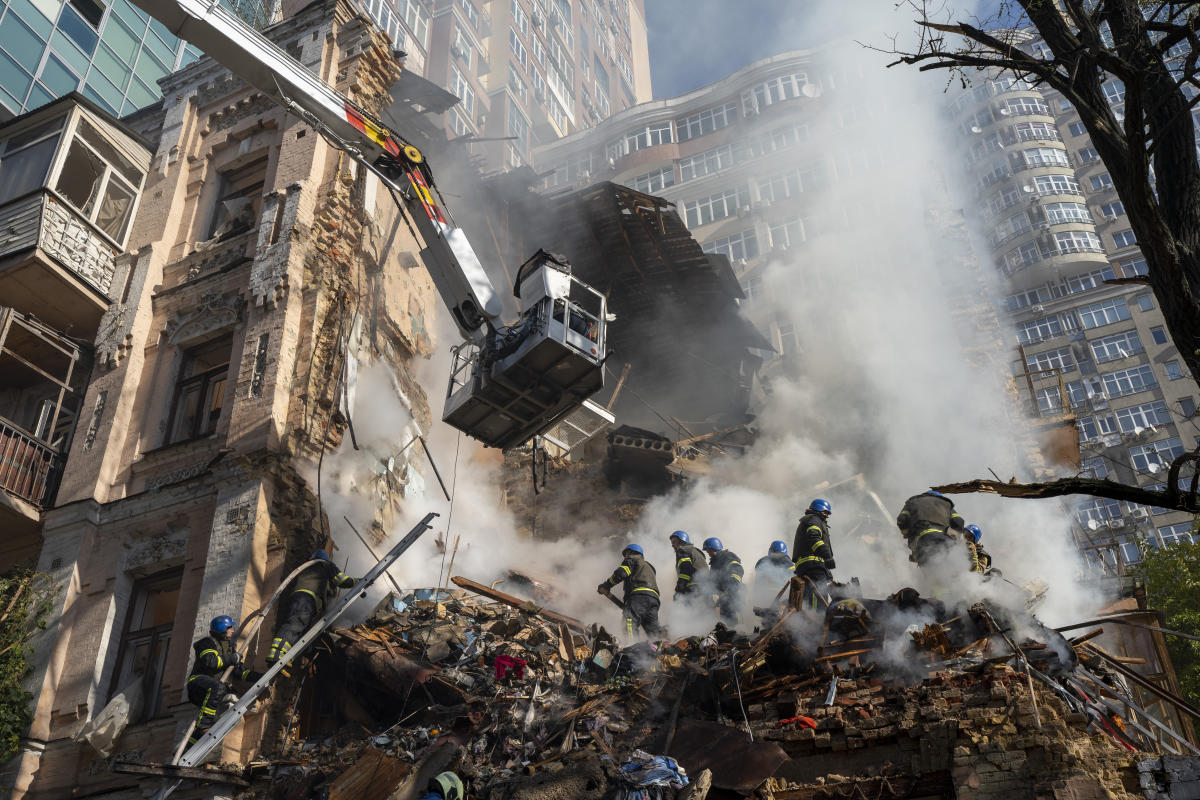JERUSALEM (AP) – The Iranian-made drones that Russia sent to central Kiev this week have complicated Israel’s balancing act between Russia and the West.
Israel has largely remained on the sidelines since Russia’s invasion of Ukraine last February so as not to damage its strategic relationship with the Kremlin. Although Israel has sent humanitarian aid to Ukraine, it has rejected Kiev’s frequent requests to send air defense systems and other military equipment and has refrained from imposing strict economic sanctions on Russia and the many Russian-Jewish oligarchs who are seeking second homes in Ukraine. have Israel.
But with news of Moscow’s closer ties to Tehran, Israel’s sworn enemy, pressure is mounting on Israel to support Ukraine in the lingering war. Israel has long been waging a shadowy war with Iran in the Middle East, over land, sea and air.
Lieutenant Colonel Richard Hecht, a military spokesman, said the suicide drone attack in Ukraine has raised new concerns in Israel.
“We’re looking at it closely and thinking about how it could be used by the Iranians toward Israeli population centers,” he said.
The debate erupted on Monday when an Israeli minister called on the government to side with Ukraine. Iran and its proxies in Lebanon, Syria, Iraq and Yemen have threatened Israel with the same delta-shaped, low-flying Shahed drones that are now exploding in Kiev.
The Iranian government has denied providing Moscow with the drones, but US officials say it has been doing so since August.
“There is no longer any doubt about where Israel should stand in this bloody conflict,” Nachman Shai, Israel’s minister of Diaspora Affairs, wrote on Twitter. “The time has come for Ukraine to also receive military aid, just as the US and NATO countries provide.”
His comments caused a storm in Russia. Former Russian President Dmitry Medvedev said on Telegram that providing military aid to Ukraine would be “a very reckless move” by Israel.
“It will destroy all interstate relations between our countries,” he wrote.
But Shai doubled down on Tuesday, emphasizing that his opinion did not match the government’s official position.
“We in Israel have a lot of experience protecting our civilian population for 30 years. We have been attacked by missiles from Iraq and missiles from Lebanon and Gaza,” Shai, a former military spokesman, told The Associated Press. “I’m talking about defense equipment to protect the civilian population of Ukraine.”
The Israeli Prime Minister’s office and the Ministry of Defense both declined to comment.
Russia and Israel have had good working relations for years and have been closely coordinating to prevent airflow over Syria, Israel’s northeastern neighbor, where the Russian air force has supported embattled President Bashar Assad. Russia has authorized Israeli fighter jets to bomb Iran-linked targets that are allegedly weapons depots destined for Israel’s enemies.
Israel is also keen to remain neutral in the war over concerns for the security of Russia’s large Jewish community. Israel is concerned about renewed anti-Semitic attacks in the country, with its long history of anti-Jewish pogroms under Russian tsars and Soviet-era purges. More than 1 million of Israel’s 9.2 million citizens have roots in the former Soviet Union.
Israel’s former prime minister, Naftali Bennett, remained strictly neutral after the invasion, refraining from condemning Russia’s actions and even trying to position himself as a mediator in the conflict. When the US and the European Union imposed sanctions on Russia, Bennett became the only Western leader to meet Russian President Vladimir Putin in Moscow.
But in recent months, Israel’s cautious stance has become more fraught.
Prime Minister Yair Lapid, who took up the post of janitor leader this summer, is more vocal than his predecessor. As foreign minister, he described reports of atrocities in Bucha, Ukraine as possible war crimes. After Russia bombed Kiev last week, he condemned the attacks “firmly” and expressed “sincere condolences to the families of the victims and the Ukrainian people”, sparking backlash from Moscow.
Tensions mounted further in July when a Russian court ordered that the Jewish Agency, a large non-profit organization promoting Jewish immigration to Israel, close its offices in the country. Israel was upset. There will be a hearing on Wednesday to decide on the future of the agency’s activities in Russia. “Anything can happen,” said Yigal Palmor, the agency’s spokesman.
Israel’s alarm over Iranian drones buzzing over Kiev has sparked debate.
“I think Israel can help even more,” said Amos Yadlin, a former head of Israel’s military intelligence. He described Israel’s “knowledge of how to handle airstrikes,” its “intelligence about Iranian weapons” and “ability to block them” as potentially crucial to Ukraine.
Iran is fighting the testing of weapons that could be used against Israel’s northern and southern borders, argued Geoffrey Corn, an expert on martial law at the South Texas College of Law in Houston.
Iran supports the militant Hezbollah group of Lebanon and Hamas in the Gaza Strip — both of which have fought protracted wars against Israel.
If the drones prove effective in Ukraine, Iran will “double their development,” Corn said. If they are shot, Iran will have a “chance to figure out how to get around those countermeasures”.
Israel’s air defense system, the Iron Dome, has a 90% interception rate against incoming rocket fire from Gaza. Ukrainian President Volodymyr Zelenskyy has lashed out at Israel for failing to provide Kiev with the anti-missile defense system.
Former Jewish Agency chairman Natan Sharansky, a former Soviet dissident, criticized his country’s unwillingness to help Ukraine in an interview with the Haaretz newspaper on Tuesday, mocking Israel as “the last country in the free world to is still afraid of irritating Putin.”
Yet some insist that Israel should not get involved in the fray precisely because it differs from its Western allies.
“We are not Germany or France,” said Uzi Rubin, a former head of Israel’s missile defense program. “We are a country at war.”
____
Associated Press writers Eleanor Reich and Josef Federman in Jerusalem contributed to this report.

